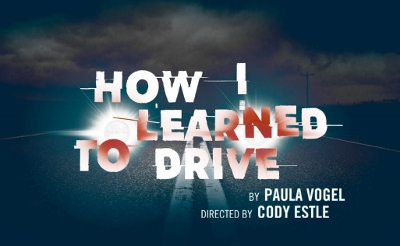HOW I LEARNED TO LOVE THEATER
Some plays take time to come into their own but they’re well worth a wait. Over two decades after its Off-Broadway debut, Paula Vogel’s How I Learned to Drive is only now reaching full impact. That’s thanks to the consciousness-raising of #MeToo, among other seismic changes in the body politic. With a vengeance and a mission, the author of The Baltimore Waltz, The Long Christmas Ride Home, and And Baby Makes Seven details a protracted sex crime in a broken family.
For 100 minutes we’re forced to face an elaborate violation of innocence by a supposedly trustworthy relation, a soul-shrinking that’s sickening in its drive to destroy. We sit helpless and contaminated just by watching this crackup, wondering how much terrible truth a one-act can possibly present.
Explicit and earthy, this searing testament is presented by a once — but no longer — future victim. Her confession, powerfully revived in artistic director Cody Estle’s staging for Raven Theatre, is insistently told through car metaphors of cruising, driving, and stripping gears and illustrated — brilliantly — by Tony Churchill’s projections of 1960s auto ads.
Throughout this twisted coming of age, Li’l Bit (a stunning Eliza Stoughton) looks back on decades of abuse, stuck in a white-trash clan that all but set her up for the kill. From the start this Maryland girl is mired in ignorance — no sex talks from an emotionally M.I.A. mom or her lascivious and feuding grandparents, and all the wrong encouragement from her peers, to consider her body a plaything for the wrong guys.
Bouncy breasts, she discovers, are meant to be jiggled for fun and popularity. Vomiting after a bad encounter restores purity. Boys will be boys but, when a man gets out of hand, he requires either the broom or the rolling pin. Her adolescent confusion is a cry for harm more than help. L’il Bit (her name appropriately anatomical) is all but ambushed by her puberty.
And one nasty adult.
Enabling and corrupting L’il Bit is a rotten relation, a false father figure with the ugly name of Peck (Mark Ulrich breaking bad all over). This creature is L’il Bit’s uncle by marriage, yoked to a wife (Kathryn Acosta) who will stand by her man in the worst way (including blaming his victim).
Teaching L’il Bit how to drive (and fish) provides this alky with an intimacy he easily exploits. It’s just too tempting to “go over the line” when no one drew any lines for L’il Bit. Whether indulging in “photo shoots” to promote his niece for possible Playboy pornography, plying her with booze, or turning the shifting of gears into a raunchy ritual, Peck imagines — despite their 31-year difference — that she’s the mate he should have married. When she turns 18, his happiness will be complete — and it won’t be statutory rape.
The crude and controlling courtship of this peckerwood loser remains consistently predatory. But L’il Bit’s shifting reactions to his unwanted advances run the gamut from grudging gratitude for Peck’s gratuitous attention to reflexive resentment over his taking advantages — and everything in between.
It’s a crash course in coping with what should never be endured: Vogel conveys it with a you-are-there immediacy and resilience that turns sheer survival into a kind of art. Vogel even injects an improbable but load-lifting infusion of gallows humor, all but recreating Carol Burnett’s toxically dysfunctional wife Eunice and her Dixie doodle family from hell.
Stoughton magnificently tempers L’il Bit’s pathetic vulnerability with a plucky practicality that defies the worst. Ulrich’s ugly uncle smoothly combines the coaxing ways of a charming horndog with the appalling narcissism of a professional pervert.
Julian Hester, Katherine Bourne Taylor, and Kathryn Acosta function as a Greek Chorus, delivering infuriating examples of the hidebound idiocy and misogynistic blinders of sex in the 60s.
Except, of course, that Peck’s incestuous outrages, horrific harassment and opportunistic oppression were hardly confined to a half century ago. Maddeningly or otherwise, L’il Bit’s crises — and, happily, her redemption — are common currency in 2019. Sure, the showier sins of a Harvey Weinstein, Kevin Spacey or Bill Cosby trigger appropriate disgust but, as Vogel depicts, pedophilia begins at home.
It’s not a perfect play — there are too many endings and it works too hard to compare driving to fornication — but, simply as an object lesson, few plays are so non-negotiably valuable, particularly for young audiences.
Telling one tough tale truly, Vogel could not have guessed in 1997 how vital this literally driving drama would prove to be today. Raven Theatre has done us proud by restoring its horrors and its healing.
photos by Michael Brosilow
How I Learned to Drive
Raven Theatre Company, 6157 N. Clark St. (at Granville)
Thurs-Sat at 7:30; Sun at 3
ends on March 24, 2019
for tickets, call 773.338.2177 or visit Raven Theatre
for more, visit Theatre in Chicago









